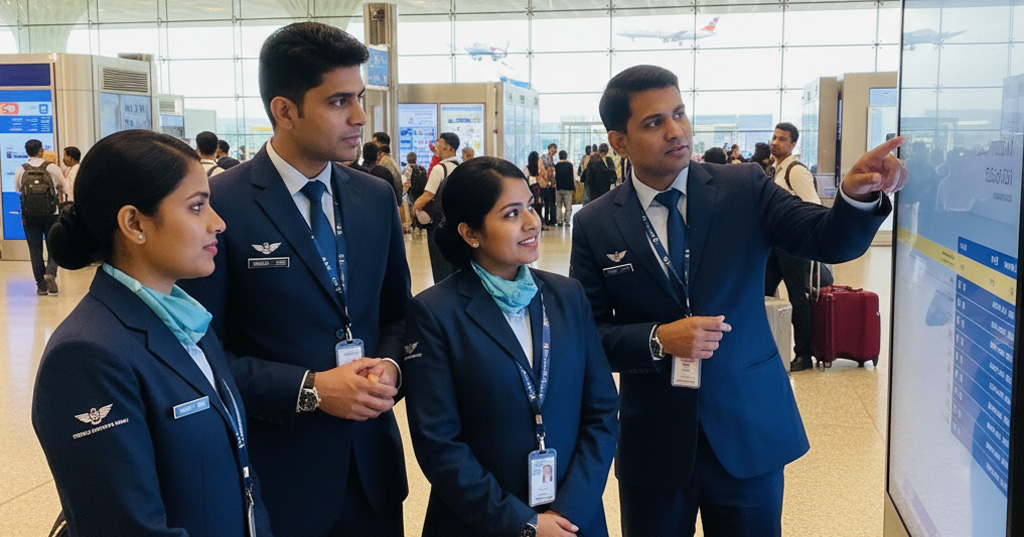How Do You Start a Career in Airport Management?

How Do You Start a Career in Airport Management?
A career in airport management begins with the right education and grows through hands-on experience, certifications, and continuous learning. Whether you aim to work in airport operations, passenger services, or high-level strategic planning, building strong communication, leadership, and problem-solving skills is essential. Networking and earning professional credentials can significantly boost your advancement in the aviation industry.
Table of Contents
ToggleEducational Requirement
To begin a career in airport management, a bachelor’s degree in Aviation Management, Business Administration, or a related field is typically required. Many universities now offer specialized programs focused on aviation and airport operations. These programs cover key subjects such as airport operations, aviation law, and business management, and often include internships to provide hands-on experience.
Key Ponits :
- Bachelor’s Degree: Core qualification for entry.
- Aviation Management Programs: Industry-focused courses.
- Airport Operations: Fundamental knowledge area.
- Aviation Law: Understanding legal frameworks.
- Business Management: Leadership and organizational skills.
- Internships: Integral for gaining early experience.
- Advanced Degrees: MBA in Aviation enhances career potential.
Relevant Certifications
Professional certifications can greatly strengthen your resume and industry credibility. Certifications like the Accredited Airport Executive (AAE) by the American Association of Airport Executives (AAAE), and the International Airport Professional (IAP) by Airports Council International (ACI), are globally recognized and can accelerate career growth.
Key Ponits :
- AAE Certification: Offers in-depth U.S. airport management knowledge.
- IAP Certification: Internationally recognized credential.
- Specialized Knowledge: Focuses on airport leadership and operations.
- Industry Credibility: Boosts your professional profile.
- Educational/Experience Requirements: Often mandatory for eligibility.
- Examinations: Rigorous testing involved.
- Career Advancement: Opens doors to leadership roles.
Gaining Practical Experience
Real-world experience is crucial. Internships, part-time roles, or volunteer opportunities at airports provide exposure to operational workflows and customer service. These experiences allow you to apply classroom knowledge in actual airport settings, and also help you build a network within the aviation sector.
Key Ponits :
- Internships: Essential for skill-building.
- Entry-Level Roles: Gain industry insights.
- Practical Application: Real-time learning environment.
- Volunteering: Exposure through aviation events.
- Networking: Establish industry contacts early.
- Critical Thinking: Develop problem-solving abilities.
- Operational Knowledge: Learn day-to-day airport functions.
Starting with Entry-Level Roles
Most careers in airport management begin with roles such as operations assistant, customer service agent, or ground staff. These positions provide foundational experience and insight into the systems that keep airports running efficiently. From these roles, you can gradually move into supervisory and managerial positions.
Key Ponits :
- Operations Assistant: Learn operational logistics.
- Customer Service Agent: Handle front-line communication.
- Ground Staff: Support airside and landside functions.
- Safety Protocols: Understand regulatory procedures.
- Workflow Management: See behind-the-scenes airport operations.
- Problem-Solving: Make decisions under pressure.
- Career Growth: These roles build a stepping stone for advancement.
Pursuing Advanced Education
To move into upper management or strategic roles, pursuing advanced education can be highly beneficial. A Master’s degree or MBA in Aviation Management provides deeper knowledge in leadership, finance, strategy, and global aviation trends—skills vital for top-tier roles.
Key Ponits :
- Master’s Degree or MBA: Specialized in aviation business leadership.
- Strategic Management: Prepares for high-level decisions.
- Aviation Finance: Key to managing large-scale airport budgets.
- Global Trends: Stay ahead of international developments.
- Leadership Skills: Prepares for executive responsibilities.
- Competitive Advantage: Strengthens your position in the job market.
A career in airport management is built on a foundation of education, practical experience, and ongoing professional development. Starting with a relevant degree and gaining hands-on exposure through internships or entry-level jobs lays the groundwork. Certifications and advanced degrees enhance your credibility and unlock leadership opportunities. By staying informed about industry trends and developing strong communication and management skills, you can thrive in the fast-paced and dynamic world of airport management.
Facebook
Twitter
LinkedIn
Blog & Article
March 29, 2025
No Comments
March 27, 2025
No Comments
March 11, 2025
No Comments
Elevate Your Knowledge, Illuminate Your Future
Connect us today for more information about Enrollment and training !
